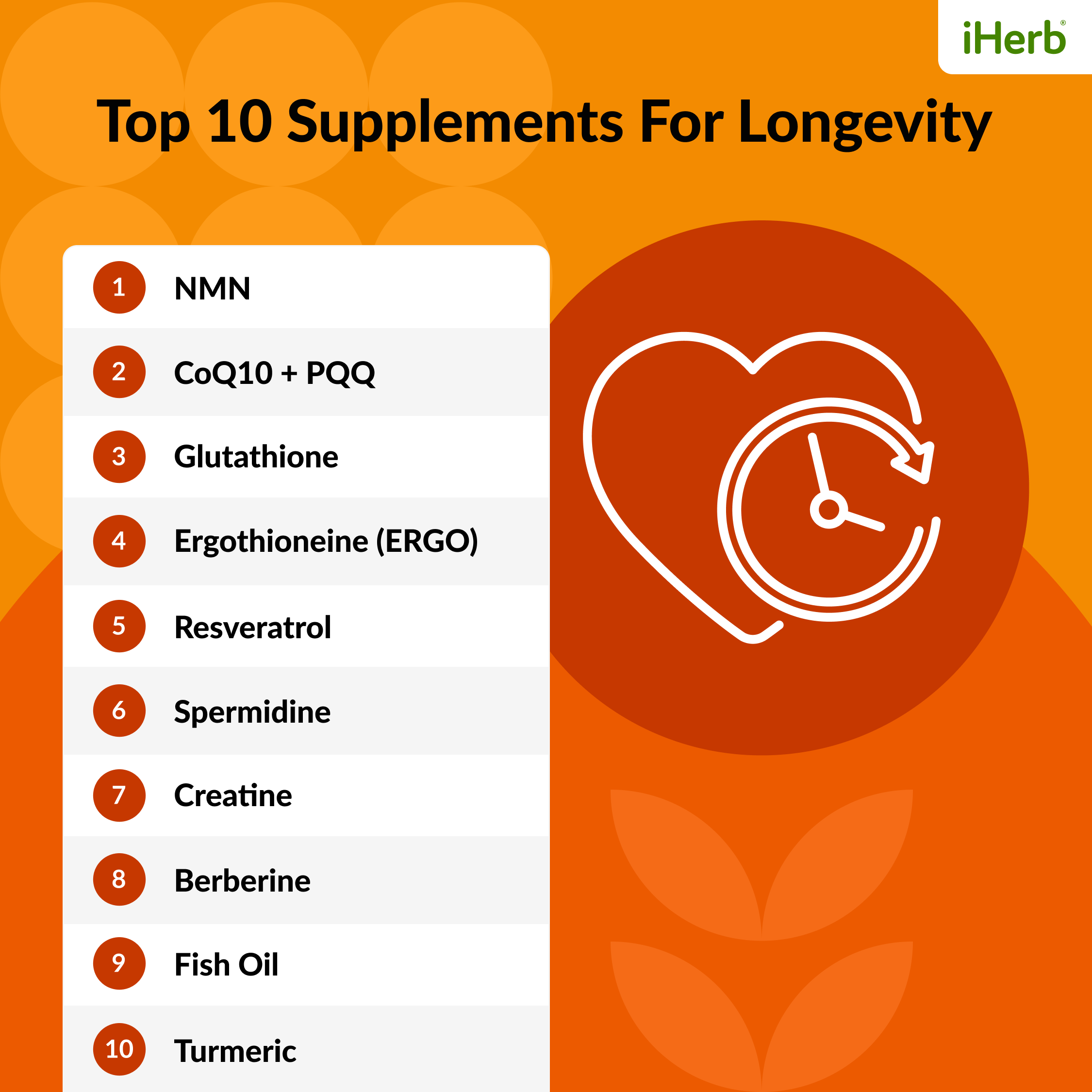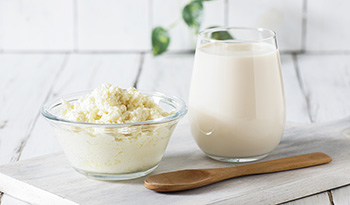Top 10 Supplements For Longevity

Key Takeaways
- A multivitamin, vitamin D3, and omega-3s form the essential base for any longevity supplement plan.
- Supplements like NMN (boosting NAD+), CoQ10 + PQQ, and creatine support mitochondrial function and energy production, which decline with age.
- Antioxidants and cellular protectors like glutathione, ergothioneine (ERGO), and curcumin help fight oxidative stress and inflammation.
- Compounds like resveratrol and spermidine enhance autophagy, the body's natural process for clearing out damaged cellular components.
Building Your Foundational Longevity Stack
My general recommendation as far as supplements go is to make sure that your nutritional foundation is strong. In addition to a health-promoting diet, I believe the following key supplements are important as foundational approaches to longevity:
- Multivitamin: A high-potency multiple vitamin and mineral formula to provide a nutritional “insurance policy” that ensures all essential micronutrients are provided in sufficient amounts.
- Vitamin D: Extra vitamin D3 because deficiency is very common (at least 50% of the general population). Higher vitamin D3 levels are associated with a 5-year difference in telomere length. Take a daily dosage of 2,000 to 5,000 IU of D3.
Top 10 Supplements For Longevity

1. NMN (Nicotinamide Mononucleotide)
Nicotinamide Mononucleotide (NMN) is a next-generation longevity nutrient shown to safely and effectively raise NAD+ levels, a vital coenzyme involved in many cellular processes, including energy production, cellular repair, and optimizing overall cellular function.
Since NAD+ levels drop with aging, supporting healthy NAD+ levels is emerging as part of a longevity and cellular health-promoting strategy.
Backed by randomized, placebo-controlled human trials, NMN may help boost mitochondrial function, cellular energy, metabolic efficiency, and anti-aging molecules in the body known as sirtuins. These effects can translate to improved physical performance, better metabolic function, and favorable shifts in biological markers.
2. CoQ10 + PQQ
The combination of coenzyme Q10 (CoQ10) and pyrroloquinoline quinone (PQQ) is key to optimizing mitochondrial function, which is key to longevity. CoQ10 is very well known, but PQQ is just beginning to get more popular. PQQ is a powerful antioxidant that specifically protects against mitochondrial damage and exerts other important actions critical to mitochondrial function. It also promotes the spontaneous generation of new mitochondria within aging cells, a process known as mitochondrial biogenesis.
Mitochondria are the energy-producing compartments in our cells. Decreased mitochondrial function is a big factor in aging, decreased cognitive function, and poor memory. Enhancing mitochondrial function requires four primary considerations:
- Providing all essential nutrients
- Utilizing mitochondrial enhancers
- Improving insulin sensitivity and blood sugar control
- Enhancing detoxification processes
- Reducing exposure to damaging factors (e.g., toxins)
3. Glutathione
One of the most important compounds that every cell in your body produces is glutathione. The cells use this valuable compound to protect themselves from damage as well as aid in detoxifying harmful compounds.
Glutathione is a small protein molecule composed of the amino acids glutamate, cysteine, and glycine. Over 100 years of research and more than 100,000 scientific papers have established maintaining cellular glutathione levels as one of the most important keys in maintaining proper cellular function and immune health, and supporting a healthy aging process.
The most popular supplemental approaches to boost glutathione levels are taking either glutathione (GSH) or N-acetylcysteine (NAC). The typical dosage for oral supplementation of reduced GSH is 250 to 1,000 mg daily. For NAC, the dosage is generally 500 to 1,000 mg daily.
4. Ergothioneine (ERGO)
Another anti-aging molecule that behaves in similar ways to glutathione is ergothioneine (ERGO), a unique naturally occurring amino acid found in many foods, but by far the richest dietary source is mushrooms. ERGO exerts several biological actions that protect and enhance cellular function, including acting as an antioxidant, inflammation regulator, and detoxification aid. There is emerging evidence that diets rich in ERGO exert these protective effects and promote longevity. For these reasons, ERGO has been referred to as the “longevity vitamin.”
Evidence shows that ERGO may support the body's natural defenses against oxidative damage, promote a healthy inflammatory response, and support mitochondrial function, all of which are important for maintaining cognitive health in the elderly. ERGO levels were significantly lower in frail elderly subjects compared to non-frail elderly subjects. Another study showed that higher ERGO levels were associated with the preservation of gait (manner of walking). Disturbance in gait is a common sign of aging.
ERGO has been shown to decrease oxidative stress in virtually every tissue and cell type studied. This represents a systemic anti-aging effect.
Since mushrooms are by far the primary dietary source, if a person is not regularly eating mushrooms, they are likely deficient in ERGO and can benefit from taking an ERGO supplement.
5. Resveratrol
Resveratrol is a polyphenol compound found in low dosages in grapes (only in the skin), red wine, peanuts, and blueberries. Most resveratrol supplements use Japanese knotweed (Polygonum cuspidatum) as the source. Resveratrol enhances autophagy and supports a healthy inflammatory response in the brain. As a result, resveratrol improved mood, mental cognition, and scores on measures of activities of daily living in older adults. Improved autophagy is likely one of the key reasons.
6. Spermidine
Spermidine is a dietary amino acid made in the human body. As its name suggests, spermidine is very important to sperm function, but it also plays a big role in cells throughout the body and as an anti-aging compound. Spermidine supports the aging process by enhancing autophagy as well as the function of mitochondria. Spermidine supplementation has been shown to extend lifespan in aging models and in mice. In humans, maintaining higher spermidine levels through the lifespan appears to contribute to living longer and promotes improved cognitive function.
7. Creatine
Creatine supplementation is another important longevity supplement. Numerous human clinical studies have shown that creatine supplementation in both men and women produces improved muscle strength and increased muscle mass. It also supports a healthy inflammatory response, helps support the body's antioxidant defenses, and promotes bone health. It exerts positive effects on brain health and mood scores as well. Maintaining muscle mass is also a major goal in any longevity plan. By the time most people reach the age of 80, their muscle mass is a little more than half of what it was in their twenties. The general dosage recommendation is 3 to 5 grams of creatine after exercise.
8. Berberine
If you have poor blood sugar control, the most important way to fight aging and promote longevity is to follow diet and supplementation strategies to improve blood sugar control.
The plant compound berberine has shown considerable benefits in supporting healthy blood sugar levels already within the normal range in human double-blind, clinical trials. It may be an important anti-aging and longevity supplement for those dealing with excessive glycosylation.
9. Omega-3
A pharmaceutical-grade, high-quality fish oil supplement that provides a combined total of 1,000 to 2,000 mg of EPA+DHA is an essential daily longevity strategy. Results from the DO-HEALTH trial, a large European clinical trial that investigated the effects of vitamin D3, omega-3 fatty acids, and a home exercise program on healthy aging in older adults, found that omega-3 fatty acids (1,000 mg daily) and vitamin D3 (2000 IU daily) significantly slowed biological aging by approximately 2.9 to 3.8 months over the three-year study. And while omega-3s alone reduced biological aging in the three measures of biological aging, the combination of omega-3s, vitamin D3, and exercise produced the greatest effect, suggesting a possible synergistic benefit.
10. Turmeric
Turmeric is a plant-based antioxidant. For anti-aging and longevity benefits, consider taking curcumin, the active compound found in turmeric (Curcuma longa). Curcumin exerts a multitude of effects that fight aging and promote longevity, but it is its ability to support a healthy inflammatory response that makes it so important. These beneficial effects have been observed in clinical studies showing certain curcumin preparations (most notably Theracurmin®, Meriva®, and C3 Complex®) to produce positive effects in supporting brain health during aging, promoting joint health, and improving metabolism.
Lifestyle Tips To Improve Longevity
Autophagy is the cellular cleansing process to dispose of cellular garbage, debris, microorganisms, and unwanted compounds. Enhanced autophagy has been found in exceptionally healthy centenarian humans and appears to be a key target for living a healthier, longer life.
To enhance autophagy, it is important to reduce the formation of excessive cellular garbage, reduce inflammation, and support mitochondrial function. Here are some key lifestyle practices to support these goals:
- Exercise, body movement, and diaphragmatic breathing are the key factors that keep autophagy functioning properly in clearing cellular debris and fighting aging.
- Eating a health-promoting diet rich in colorful fruit and vegetables, as well as nuts and seeds, and adequate in protein.
- Avoiding sugar and over-consumption of carbohydrates and calories.
- Intermittent fasting – one popular method is a daily 16-hour fast with an 8-hour eating window.
- Regularly consume superfoods like spirulina and other super greens, raw cacao, berries, green tea (particularly matcha), etc.
- Spice it up! In addition to taking curcumin as a supplement, use other spices and herbs liberally in the diet to take advantage of all of their benefits in fighting inflammation and protecting mitochondria.
What Causes Aging?
Accelerated aging is characterized by several factors, including chronic, low-grade inflammation, reduced mitochondrial function, excessive glycosylation, and other signs of cellular damage. All of these factors are interrelated.
Typically, as people age, there is an increase in inflammation and a decline in mitochondrial numbers and function. This combination results in the accumulation of cellular debris. With sufficient energy, cells can clear this cellular waste through autophagy. But with decreased mitochondrial function and energy production, the cellular debris is not cleared through autophagy and, as a result, is another big trigger of chronic inflammation.
In many cases, the following factors are the underlying contributors to the two major causes of death, namely heart disease and cancer.
- Obesity
- Poor Blood Sugar Control
- Smoking
- Alcohol Abuse
Is Memory Loss Inevitable With Aging?
Since the brain is the most metabolically active tissue in the body, the effects of aging can hit it hard. While age can affect cognition, memory loss is not inevitable. Steps can be taken to support and maintain brain health throughout life.
Young or old, our nutritional status plays a vital role in determining how well our brains function. It is also important to point out that there is a very strong link between cardiovascular health and brain health. Not surprisingly, many of the same dietary, lifestyle, and supplement strategies to support heart health have the additional benefit (either directly or indirectly) of supporting brain health.
Conclusion
Achieving healthy longevity isn't about finding a single magic bullet, but rather harnessing the remarkable power of synergy. Combining a nutrient-dense diet, an active lifestyle, and targeted, science-backed supplements like NMN, CoQ10, and omega-3s offers the most potent strategy for slowing the aging process.
The goal is not just to live longer, but to live better—emulating the "Super Agers" who experience graceful, healthy aging with sustained mental and physical vitality.
Start by adopting healthy lifestyle habits, ensuring your foundational nutritional needs are met, and then explore these top longevity supplements. However, always consult with your healthcare provider before beginning any new supplement routine to ensure it's appropriate for your individual health needs.
References:
- Wang M, Cao Y, Li Y, et al. Research advances in the function and anti-aging effects of nicotinamide mononucleotide. J Zhejiang Univ Sci B. 2024 Sep 15;25(9):723-735.
- Islam MA, Sehar U, Sultana OF, et al. SuperAgers and centenarians, dynamics of healthy ageing with cognitive resilience. Mech Ageing Dev. 2024 Jun;219:111936.
- Guo J, Chen H, Zhang X, et al. The Effect of Berberine on Metabolic Profiles in Type 2 Diabetic Patients: A Systematic Review and Meta-Analysis of Randomized Controlled Trials. Oxid Med Cell Longev. 2021 Dec 15;2021:2074610.
- Panigrahi A, Mohanty S. Efficacy and safety of HIMABERB® Berberine on glycemic control in patients with prediabetes: double-blind, placebo-controlled, and randomized pilot trial. BMC Endocr Disord. 2023 Sep 7;23(1):190.
- Strasser B, Volaklis K, Fuchs D, Burtscher M. Role of Dietary Protein and Muscular Fitness on Longevity and Aging. Aging Dis. 2018 Feb 1;9(1):119-132.
- He W, Connolly ED, Cross HR, Wu G. Dietary protein and amino acid intakes for mitigating sarcopenia in humans. Crit Rev Food Sci Nutr. 2024 May 27:1-24.
- Richards JB, Valdes AM, Gardner JP, et al. Higher serum vitamin D concentrations are associated with longer leukocyte telomere length in women. Am J Clin Nutr 2007;86(5):1420-5.
- Bischoff-Ferrari HA, Gängler S, Wieczorek M, et al. Individual and additive effects of vitamin D, omega-3 and exercise on DNA methylation clocks of biological aging in older adults from the DO-HEALTH trial. Nat Aging. 2025 Feb 3.
- Izadi M, Sadri N, Abdi A, Zadeh MMR, Jalaei D, Ghazimoradi MM, Shouri S, Tahmasebi S. Longevity and anti-aging effects of curcumin supplementation. Geroscience. 2024 Jun;46(3):2933-2950.
- Lapenna D. Glutathione and glutathione-dependent enzymes: From biochemistry to gerontology and successful aging. Ageing Res Rev. 2023 Dec;92:102066.
- Raghu G, Berk M, Campochiaro PA, Jaeschke H, Marenzi G, Richeldi L, Wen FQ, Nicoletti F, Calverley PMA. The Multifaceted Therapeutic Role of N-Acetylcysteine (NAC) in Disorders Characterized by Oxidative Stress. Curr Neuropharmacol. 2021;19(8):1202-1224.
- Beelman RB, Kalaras MD, Phillips AT, Richie JP Jr. Is ergothioneine a 'longevity vitamin' limited in the American diet? J Nutr Sci. 2020 Nov 11;9:e52.
- Ames BN. Prolonging healthy aging: Longevity vitamins and proteins. Proc Natl Acad Sci U S A. 2018 Oct 23;115(43):10836-10844.
- Cheah IK, Halliwell B. Ergothioneine, recent developments. Redox Biol. 2021 Jun;42:101868.
- Kondoh H, Teruya T, Kameda M, Yanagida M. Decline of ergothioneine in frailty and cognition impairment. FEBS Lett. 2022 May;596(10):1270-1278.
- Kameda M, Teruya T, Yanagida M, Kondoh H. Frailty markers comprise blood metabolites involved in antioxidation, cognition, and mobility. Proc Natl Acad Sci U S A. 2020 Apr 28;117(17):9483-9489.
- Nierenberg JL, He J, Li C, Gu X, Shi M, Razavi AC, Mi X, Li S, Bazzano LA, Anderson AH, He H, Chen W, Guralnik JM, Kinchen JM, Kelly TN. Serum metabolites associate with physical performance among middle-aged adults: Evidence from the Bogalusa Heart Study. Aging (Albany NY). 2020 Jun 1;12(12):11914-11941.
- Jonscher KR, Chowanadisai W, Rucker RB. Pyrroloquinoline-Quinone Is More Than an Antioxidant: A Vitamin-like Accessory Factor Important in Health and Disease Prevention. Biomolecules. 2021 Sep 30;11(10):1441.
- Nakano M, Ubukata K, Yamamoto T, Yamaguchi H. Effect of pyrroloquino- line quinone (PQQ) on mental status of middle-aged and elderly persons. FOOD Style. 2009;21:13(7):50-3.
- Harris CB1, Chowanadisai W, Mishchuk DO, et al. Dietary pyrroloquinoline quinone (PQQ) alters indicators of inflammation and mitochondrial-related metabolism in human subjects. J Nutr Biochem. 2013 Dec;24(12):2076-84.
- Kitada M, Koya D. Autophagy in metabolic disease and ageing. Nat Rev Endocrinol. 2021;17(11):647-661.
- Pavlova JA, Guseva EA, Dontsova OA, Sergiev PV. Natural Activators of Autophagy. Biochemistry (Mosc). 2024 Jan;89(1):1-26.
- McCarty MF. Nutraceutical and Dietary Strategies for Up-Regulating Macroautophagy. Int J Mol Sci. 2022;23(4):2054.
- Brimson JM, Prasanth MI, Malar DS, et al. Plant Polyphenols for Aging Health: Implication from Their Autophagy Modulating Properties in Age-Associated Diseases. Pharmaceuticals (Basel). 2021;14(10):982.
- Truong VL, Jun M, Jeong WS. Role of resveratrol in regulation of cellular defense systems against oxidative stress. Biofactors. 2018 Jan;44(1):36-49.
- Koushki M, Dashatan NA, Meshkani R. Effect of Resveratrol Supplementation on Inflammatory Markers: A Systematic Review and Meta-analysis of Randomized Controlled Trials. Clin Ther. 2018 Jul;40(7):1180-1192.e5.
- Marx W, Kelly JT, Marshall S, et al. Effect of resveratrol supplementation on cognitive performance and mood in adults: a systematic literature review and meta-analysis of randomized controlled trials. Nutr Rev. 2018 Jun 1;76(6):432-443.
- Madeo F, Bauer MA, Carmona-Gutierrez D, Kroemer G. Spermidine: a physiological autophagy inducer acting as an anti-aging vitamin in humans? Autophagy. 2019;15(1):165-168.
- Kiechl S, Pechlaner R, Willeit P, et al. Higher spermidine intake is linked to lower mortality: a prospective population-based study. Am J Clin Nutr. 2018;108(2):371-380.
- Schroeder S, Hofer SJ, Zimmermann A, et al. Dietary spermidine improves cognitive function. Cell Rep. 2021;35(2):108985.
- Juneja K, Bhuchakra HP, Sadhukhan S, Mehta I, Niharika A, Thareja S, Nimmakayala T, Sahu S. Creatine Supplementation in Depression: A Review of Mechanisms, Efficacy, Clinical Outcomes, and Future Directions. Cureus. 2024 Oct 16;16(10):e71638.
- Xu C, Bi S, Zhang W, Luo L. The effects of creatine supplementation on cognitive function in adults: a systematic review and meta-analysis. Front Nutr. 2024 Jul 12;11:1424972.
DISCLAIMER:This Wellness Hub does not intend to provide diagnosis...
















































































 Table of Contents
Table of Contents















